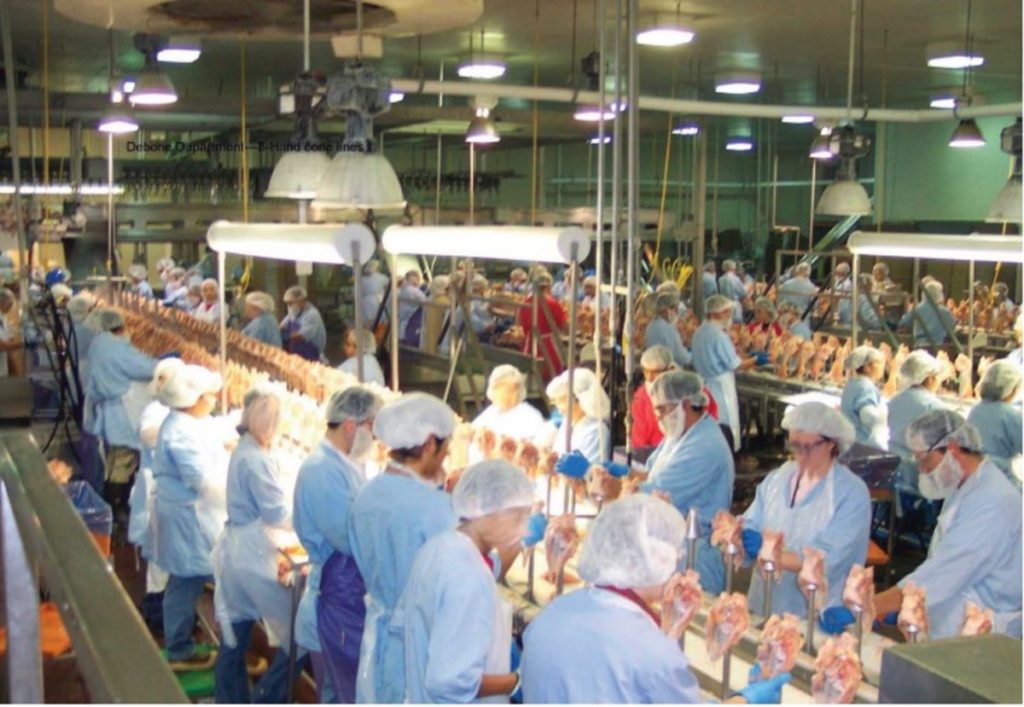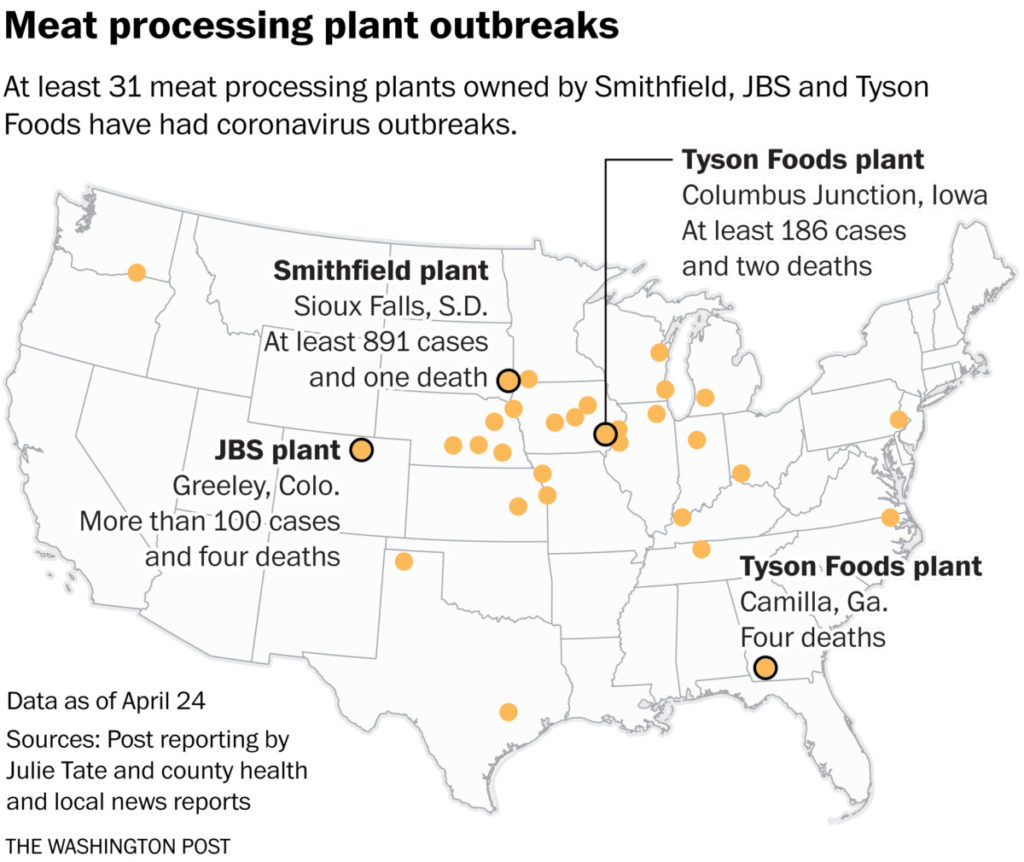Meat Plants Reveal Hidden Injustices During COVID-19
In an age of a pandemic, health protocols have adopted an entirely new meaning. When wearing masks and gloves has become the standard, and obsessive hand washing has become a measure necessary to avoid hospitalization, strict protocols are critical to the preservation of health and safety. Despite the fears that COVID-19 has instilled in Americans across the country, meat plants have failed to institute proper precautionary measures, forcing workers who rely on their income to choose between their jobs and their health. While citizens often feel as though COVID-19 is unstoppable, it is only being fueled by food plants’ inability to refine, follow, and invest in extensive safety protocols. For large plants, health came at the expense of profits.
While there are always people in vulnerable positions, COVID-19 has certainly heightened that reality. As Alexandra Plakias discusses in Thinking Through Food, epistemic injustice serves as a barrier to exercising control over an individual’s life. She argues that those who are in epistemically vulnerable positions are forced to shop at large grocery stores that have deceiving labels, but come with a cheaper price. She writes, “Because dependence on processed and manufactured foods means dependence on testimony from unreliable sources, the consumers who eat these foods are forced into a disadvantageous epistemic position” (Plakias, 2019, 24). Similarly to how people are forced to make food decisions based on their economic position, as with people who are forced to shop at large grocery stores instead of farm-to-table markets, the workers at meat plants are in a similar epistemically vulnerable position. Plakias writes, “This is a kind of epistemic injustice, where a lack of economic resources or social status places one in a disadvantaged epistemic position” (Plakias, 2019, 24). Those who work in the early stages of food production, like workers at meat plants, likely have a low socioeconomic status. While their economic and social position regularly affects their ability to exercise control, this lack of control now affects their health and safety due to the escalating circumstances of COVID-19. So I ask, how has COVID-19 exacerbated the problem of injustice within the food sector?
It is important to understand the demographic that is specifically being affected. According to the Bureau of Labor and Statistics, meat plants workers report earn an average of 23,790 dollars a year (BLS, 2019). To place this into perspective, CNBC reports that the necessary living wage falls within 50,000 to 70,000 depending on the city that one is located in (CNBC, 2019). In other words, the minimum wage earners, such as the individuals working at these meat plants, are unable to make a living wage, putting them in an epistemically vulnerable position. Especially during COVID-19, people are feeling added financial strain as companies are laying off employees or closing. In this way, employees are often forced to work even during a pandemic, especially those working in food plants who cannot afford the luxury of staying home.

While employees are going to work and risking their safety, meat plants are sacrificing safety protocols to increase production. According to USA Today on April 22, The U.S. Department of Agriculture has “relaxed” its standards because of decreased production as a result of COVID-19. They write, “Just this month, the agency allowed 15 poultry plants to exceed federal limits on how many birds workers can process in a minute” (USA Today, 2020). This is far higher than any previous limit in United States history. Beyond this, however, meat plant workers are forced to work within close proximity to one other, which is only exacerbated by these new regulations. Individuals are supposed to practice safe distancing, where they remain six feet away from others at all times. However, “These waivers guarantee that workers are more crowded along a meatpacking line and more workers are put at risk of either catching or spreading the virus” (USA Today, 2020) Meat producers like Tyson foods and Wayne Farms, which are in grocery stores all over the country, have experienced increasing cases of COVID-19, which in some cases have resulted in death.

While meat plants are claiming they are increasing safety regulations, several employers report that they are being forced to work in these conditions even when they are not feeling well, likely furthering the spread of COVID-19. The Washington Post reports, “Three of the nation’s largest meat processors failed to provide protective gear to all workers, and some employees say they were told to continue working in crowded plants even while sick as the coronavirus spread around the country and turned the facilities into infection hot spots” (The Washington Post, 2020). While plants around the country have closed for a small period of time to slow the spread of rates, this was far too late. Workers had already experienced extreme health consequences by being forced to work in non regulatory environments, further revealing their epistemically vulnerable position. Smithfield chief executive Kenneth Sullivan said, “It is impossible to keep our grocery stores stocked if our plants are not running” (The Washington Post, 2020). While COVID-19 cases are on the rise, meat plants are worried about the reduction in their employees due to illness and how this will affect their ability to sell their product to grocery stores.
Despite the extreme concerns of health and safety, many meat plants are overly concerned with their financial success and are unwilling to invest in safety precautions. While stocking grocery shelves is essential to the well being of vulnerable populations who rely on this cheaper source of food, workers are economically forced into a position where they have to risk their safety at the expense of feeding others. COVID-19 has burdened all parties, but those in a higher socioeconomic position can afford to make decisions that protect their health. The choice between health and economic security is evidence of rampant injustices plaguing our most vulnerable populations. However, how do we choose who gets the resources they need? If grocery stores are not stocked that puts the population at risk, but if the meat plants stay open workers will die. These injustices are multilevel. So I ask, are the injustices during COVID-19 novel to the circumstance or does it merely heighten a problem that has been lying in the dark for years?

With the rising number of COVID-19 cases in meat plants, this pandemic has revealed underlying injustices that have long existed. Turning health and economic security into mutually exclusive options demonstrates the relationship between wealthy industry owners and workers in epistemically vulnerable positions. This situation is not novel to COVID-19– there is longstanding evidence that employers often abuse the epistemically vulnerable position that plagues their workers, capitalizing on their socioeconomic status and the limitations that inhibits their ability to make choices surrounding work. Perhaps COVID-19 has brought previously hidden, but significant problems to light.